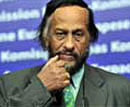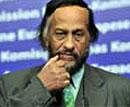
"An upsurge in action at the grass-roots level is needed and it is our children and grandchildren that will face the brunt of our inaction," Rajendra Kumar Pachauri, Director General of The Energy and Resources Institute (TERI), has said.
Pachauri, who also heads the Intergovernmental Panel on Climate Change (IPCC), was addressing the opening plenary of the second day of the World Future Energy Summit (WFES) in Abu Dhabi.
During the opening plenary of the second day of the Summit, the UAE Minister of Environment and Water, Rashid Ahmad Bin Fahad, stressed the need to simplify the procedures in financing funds that have decided to be established by Copenhagen accords.
He also pointed to the need to subdue the constraints that might hinder developing nations from receiving financial support and access to new technologies that they need. "Business as usual is not acceptable as risk of climate change escalates," he said.
The session, the third plenary in the four-day event, saw the panel discuss how much industrialised countries were willing to reduce their emissions of greenhouse gases. Jonas Gahr Store, Norwegian Minister of Foreign Affairs, said "Copenhagen was far away from filling all our expectations, but we must see it as a start," he commented.
The plenary session panel was opened by the minister and was moderated by Richard Banks, CEO of R M Banks & Co.
Besides Pachauri, Jonas Gahr Store, Minister of Foreign Affairs of Norway; Ditlev Engel, Global President & CEO of Vestas Wind Systems and Richard Jones, Deputy Executive Director of the International Energy Agency (IEA) were also present.
More than 100 official delegations are present at the Summit from countries including Australia, Belgium, China, Italy, India, South Korea, Spain, Germany, USA, Canada, United Kingdom, Switzerland, Netherlands, Japan, Taiwan, Norway and France.
